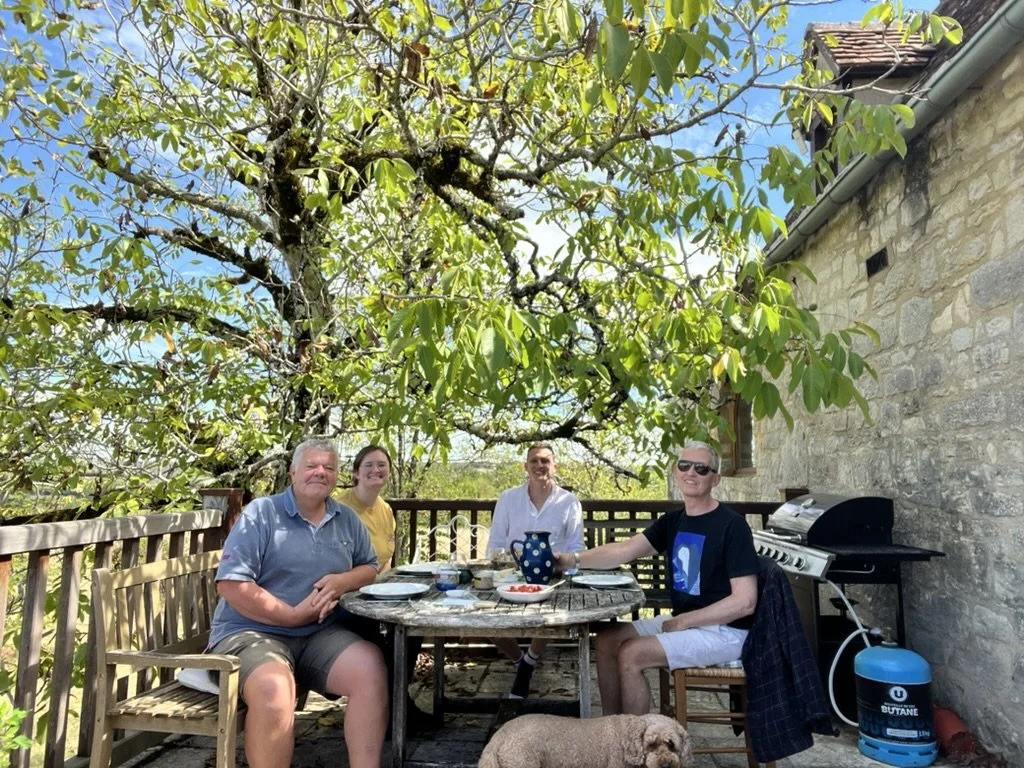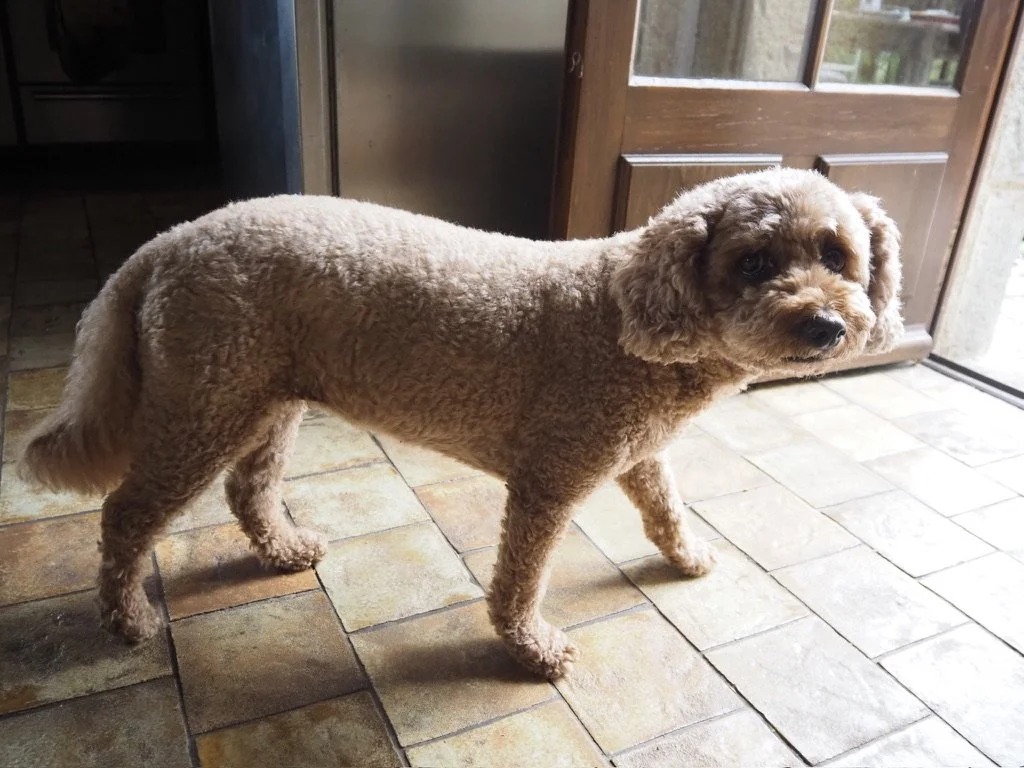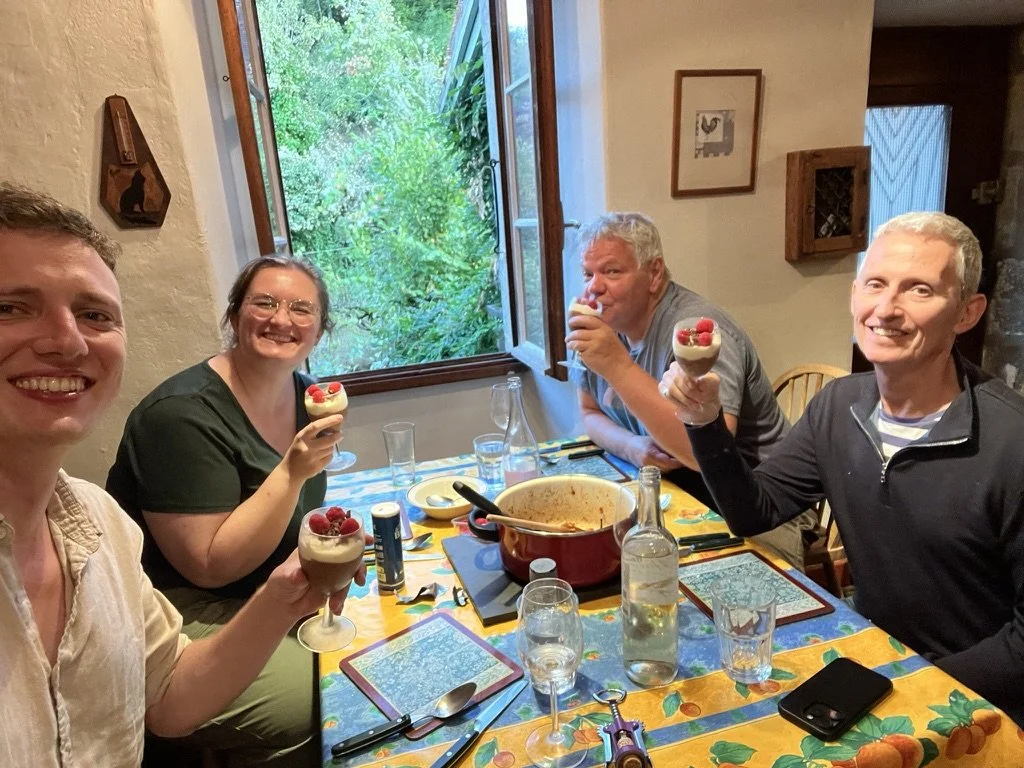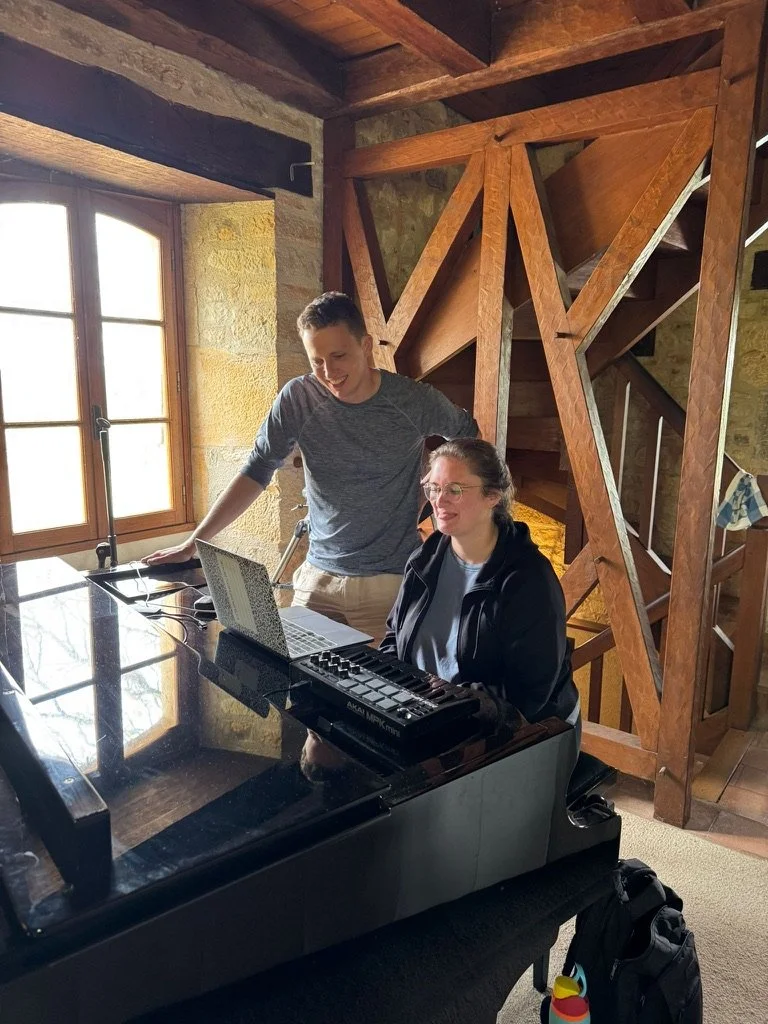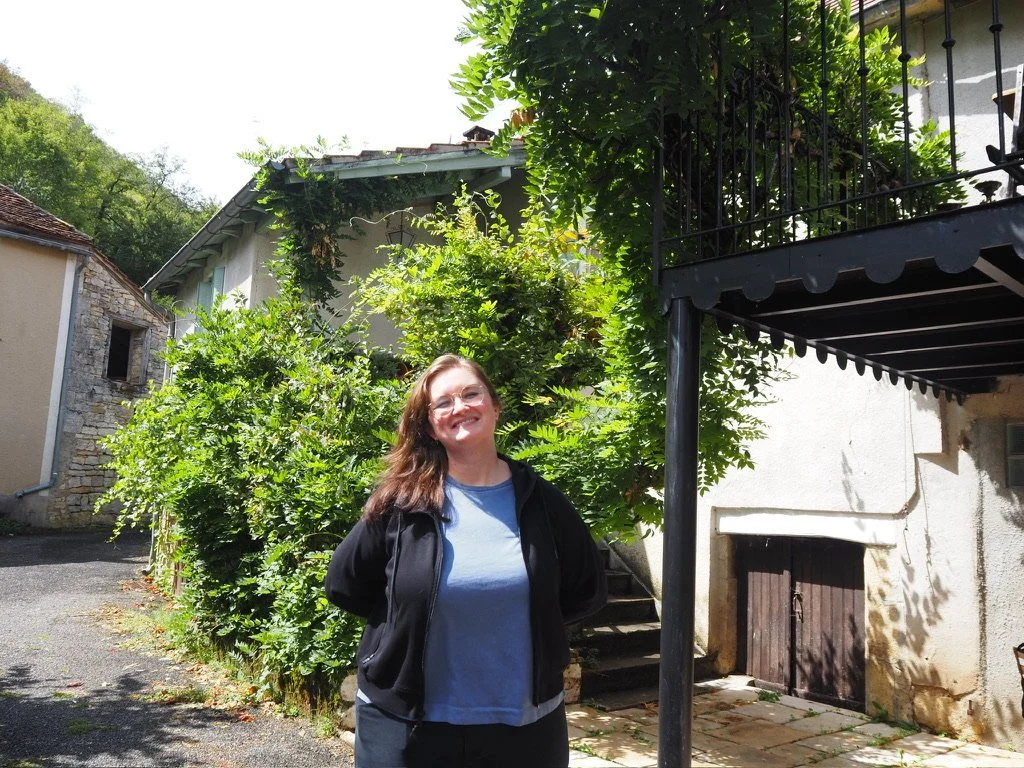A Week in France with George and Ants
In June of this year, Eliza and I learned – with, let’s just say, no little shock – that we’d won the 2025 MTI Stiles + Drewe Mentorship Prize with our musical Echolocation.
We knew all about Stiles and Drewe, of course. They were musical theatre writing legends, the brilliant minds behind Honk! and Betty Blue Eyes and the stage version of Mary Poppins. If they ever needed a CV, it would boast over a dozen musicals, Olivier and Tony Awards, and a writing partnership in its fifth decade. I’d grown up watching their shows in London; Eliza had grown up watching them in Nevada and Utah. You know you’ve made it when your shows are playing in Nevada community theatres.
The mentorship prize is yearlong. The first part consisted of a writing residency at Anthony Drewe’s house in France – just the four of us. As the week crept closer, Eliza and I were full of excitement, as well as a few butterflies. What should we expect? Who were the men who made up the team?
I write this account partly to demystify the prize for other emerging musical theatre writers. But mostly, I write it as a tribute to the most wonderful week, with the best food and best company.
First Impressions
The Brîve airport is so small that there’s only one direct flight from the UK each week. And so Eliza and I found ourselves, one bleary-eyed morning, trudging through the RyanAir queue at Stansted towards that flight.
I’m more Type A (i.e. neurotic) than Eliza, so I was listening once again to Betty Blue Eyes, memorising my favourite rhymes (“Cash in a coupon / I'll put the soup on”) and practising my loglines. Although I’d crossed paths with our new mentors a few times, I was anxious to make a good impression. This wasn’t just a chance to improve our show; it was a chance to network with two big-hitters.
And then, before we knew it, we were emerging from the Limousin aéroport to see the beaming figure of Ants – Ants, not Anthony – and I forgot all about the networking bullshit.
The first thing to say is that George and Ants are two of the nicest men you could ever meet. They’re also excellent company, brimming with stories and unprintable anecdotes. The entire drive home, Ants regaled us with their misadventures in Hollywood and tidbits of local history. He bought his French house – nicknamed L’Autre Ciel, a reference to their musical Peter Pan – in his 40s (and learned French to boot). George has been visiting him ever since, often for weeks at a time, and has written many a song at the grand piano in the living room.
The house itself is stunning, an old stone French building with shutters on the windows and a swimming pool in the back. Books were strewn across the kitchen and living room – many of them children’s books, which they were considering adapting. There was pig memorabilia everywhere. (George and Ants have written not one but two porcine shows: Betty Blue Eyes and The Three Little Pigs.) Eliza and I installed ourselves in the gîte (apartment) that they’d rented for us in the local village, and then it was time for drinks and dinner.
Unsurprisingly, the wine and conversation flowed freely. Musical theatre is a small world, but even so I was amazed at the names that were mentioned so casually under my probing – how Alan Jay Lerner had been in the audience the night they won the Vivian Ellis Prize (and so kickstarted their careers); how Cameron Mackintosh had sent them on an all-expenses-paid safari after Just So didn’t transfer to the West End; how Stephen Sondheim had been a constant supporter in their early days. (It seems that if you were writing musicals in the 80s, you could hardly avoid Sondheim’s generosity.)
Our most effusive host was the dog, a lively cavapouchon called Sixpence – named after their musical Half a Sixpence – who came leaping and licking us the moment we arrived.
Day-to-Day
Here was a typical day:
8:30am. Ants swings by in his car and picks us up from our gîte. He’s already been to the village, where he’s picked up fresh croissants and other ingredients (mostly cheese).
8:45am. The four of us – Ants, George, Eliza and I – have breakfast on the patio. Breakfast consists of coffee, a salade des fruits, croissants and slabs of beurre and confiture. (My GCSE French gets put through its paces.) Sixpence, who has already had her breakfast, whines pitifully until Ants gives her nibbles off his plate.
9:15am. To work! On the first day, George and Ants read our musical aloud in front of us – an experience that could easily have been mortifying but was actually beautiful – and then treat us to some of the best notes we’ve ever received. They start with a reminder that they really like the show (Oh God, here it comes, you think). But the critique that follows is neither sugarcoated nor severe; rather, it’s engaged, attentive, full of intelligent questions and honest reactions. The notes are both big (“This song isn’t funny enough to justify its existence”) and small (“I like that line – don’t cut it!”). They pay us the respect of treating us as peers, not students.
9:15am-1pm. Eliza and I tinker away at the show on Ants’s piano. Ants and George are usually in the next room, well within earshot, which sharpens the creative process.
1pm. A splendid déjeuner, again on the patio. Eliza and I quiz our mentors about their work and lives. Ants did a degree in zoology; he and Eliza speculate on whether the distant swarm of flying animals are swallows, bats or something smaller. (After some research, he later informs us they were processionary moths: poisonous as caterpillars, harmless when mature.) George and I chat about the English choral tradition – he’d been an organist, I’d been a chorister – and compare our favourite works by Finzi, Parry, Howells. Every day, we eat cheese and bread and tomatoes in a vinaigrette. Sixpence, who has already had her lunch, whines pitifully until Ants gives her nibbles off his plate.
2pm. Eliza and I make the pretty commute home down the hillside chemin that was once used by French schoolchildren. The hedgerows are teeming with blackberries. George and Ants have a few hours uninterrupted by our plinkety-plonk.
2.15-6pm. Back to work! The gîte has an electric keyboard but hit-and-miss WiFi, which has the beautiful effect of disconnecting us from the outside world. On hot days I write outside on the balcony, thinking I could get used to this.
6pm. Ants picks us up in his car. Sixpence is always ecstatic to see him when we get back, even though he’d only been gone a few minutes. He and George are both phenomenal cooks, and one or the other of them will have whipped up a delicious meal.
6:30pm. We eat aforementioned meal around the kitchen table. The wine flows freely; desserts are mandatory. Sixpence, who has already had her dinner, whines pitifully until Ants gives her nibbles off his plate.
7pm. Games!
Sometime later. Ants drops us back off at the gîte. There’s hardly any light pollution in this part of France, and the sky is full of stars. We sleep like the dead.
There are variations. Sometimes we give performances of the material we’ve been working on. Sometimes Ants shares bits and pieces of his new work. One night, our mentors take us out to dinner at a gorgeous local restaurant one night, and we toast the spirit of Howard Ashman (who would have been 75 this year).
In this way, over the week, we write a new song and completely revamp three more. It’s perhaps the most productive week of our songwriting lives.
Games
If you go onto the Stiles & Drewe website, you’ll learn about their awards. You won’t learn about their infectious love of after-dinner games.
Not that we needed much infecting. Eliza and I had lived together in a 14-person house (more on that here), where game nights had been a weekly staple. (Word to the wise: never play Settlers of Catan with Eliza Randall.) And so when Ants suggested a game of Heads-Up – the phones-on-foreheads word-guessing game created by Ellen DeGeneres – we eagerly agreed, ready to pit our youthful synergy against theirs.
Reader, we got trounced.
First it was the Animals category. Then Geography, World Attractions, Rhymes. (This last one generated some controversy as it became clear Ellen was favouring dubious American rhymes, girl/squirrel being the chief culprit.) On successive nights, they merrily demolished us at Yahtzee and Telestrations. It turns out that a lifelong collaboration really gets you thinking on the same wavelength.
The high point came on the last night, when we once again played Heads-Up, this time opting for the Broadway category. Here’s a representative dialogue:
Eliza: (Trying to convey “Liza Minnelli”) Short brown hair. Big eyes.
Sam: ???
Eliza: EGOT winner.
Sam: ???
Eliza: Daughter of Judy Garland.
Sam: ???
Eliza: Sally Bowles.
Sam: Gail Rankin?
And here’s what we were up against. (Details invented.)
Ants: Chris was just in this one.
George: Sunday in the Park with George.
Ants: Jane is doing their lighting design.
George: The King and I.
Ants: We had tea last week.
George: Patti LuPone.
Ants: I love this show!
George: Shucked.
A deeply humbling experience all round.
There was a memorable moment when Eliza had to convey “Mary Poppins”. She pointed sheepishly at our mentors: “They wrote it.”
42 Years and Counting…
Gilbert and Sullivan famously despised one another. Rodgers and Hart had a fractious, volatile relationship. Brecht and Weill brought opposing artistic sensibilities to their collaboration, leading not just to arguments but lawsuits.
George and Ants, by contrast, are the very best of friends. It was clear in how they cooked together, coordinated their holidays, finished each other’s stories. It was clear in their in-jokes and nods and silences and gentle insults; when one would remind the other that they needed to film a video for such-and-such fundraiser; when, unprompted, they would break into song together (“I’m a ramblerrrr, I’m a gamblerrrrr”).
The history of musical theatre collaborations is mostly a history of clashing egos; think of the volcanic temperaments of Jerome Robbins, Arthur Laurents, Bob Fosse, Frank Loesser. And, in fairness, making a musical is a long and bruising process: two (or more) collaborators spurring each other to greater heights, poring over each scintilla of the script and score and productively disagreeing. Reviews, billing, royalties, “the brand” – there’s a minefield of reasons to chafe and feel unappreciated. As an old teacher once quipped to me, “Writing partnerships often weather failure better than success.”
Not Stiles + Drewe. At one point, Ants mentioned that theirs is one of the longest-running musical theatre writing partnerships in history – 42 years and counting.
And I was struck by how little changes in forty years. So much of their routine reminded me of ours: the hustle of trying to midwife a production, the discussions about this director and that theatre, the giddiness of sharing new material, the excitement of new collaborations, the gossiping, the constant singing. I used to think, naively, that once you reached a certain level of success, you could focus on being a writer rather than an entrepreneur. Alas, the hustle never ends.
It was the least we could do to treat them to dinner in our gîte one evening. I made a big pot of pasta alla Norma. Eliza whipped up four immaculate chocolate mousses. We welcomed our mentors in, sang them a new song, ate together, and played several cut-throat rounds of Perudo – where, at last, I scored a victory.
At the end of the evening, we gave them pens with their names embossed in gold – a grateful gift from one writing team to another.
Final Thoughts
Many times over the week, I thought: This. This is a good life. A beautiful house, a loving dog, lifelong friendships, fresh croissants, French cheese, outdoor meals, after-dinner games, a career spent following your first passion, doing well and doing good alike. And of course, the knowledge that you’ve helped ignite a renaissance of new musicals in the UK.
At dinner one night, I put aside my very British allergy to expressing emotion, and sincerely thanked them for everything they’ve done. And, quite seriously, they said that they’d been helped in turn – not least by Stephen Sondheim.
George recalled an email they’d received after Honk! opened at the National Theatre. It was from Sondheim. He’d been walking across Waterloo Bridge, and had seen STILES + DREWE up in lights on the side of the Olivier, and (he said) shed a tear of joy; two of his protegés, seventeen years into their writing careers, had created the first new British musical ever to be produced at Britain’s National Theatre. George added that because they’d received so much support at the start of their journeys, they felt duty-bound to pay it forward.
That sentiment is much expressed, rarely practised. The theatre industry on both sides of the Atlantic is in the grip of a powerful scarcity mindset. It’s hardly surprising: there’s little money, few opportunities, much competition. And, of course, a good deal depends on who you know – on whether you have relationships with theatres, introductions to producers, access to money.
But relationships between writers are unique in that they can almost never be transactional. They can be prickly, competitive and insecure, or they can be generous, uplifting and inspiring – but fellow writers can almost never give you stuff, except for advice and honest feedback. And so perhaps it’s fitting that George and Ants occupy the role in the British theatrical ecosystem that Sondheim once held in America: artistic godfathers to a generation of musical theatre creators.
Along with an invaluable set of notes and two new friendships, I take three big lessons from my week in France.
The first is that the work never ends: even when you’ve had many shows on the West End and Broadway, you’ll still spend weekends working out your point of contact with such-and-such artistic director, trying to triangulate a production into existence.
The second is that, with luck, writing musicals can bring you a life of joy and fulfilment and material comfort. I’m reminded of Sarah Ruhl’s anecdote about her former professor, Paula Vogel. After writing How I Learned to Drive, Paula invited Sarah to her beautiful waterfront house in Cape Cod and said, “I want you to look out over that balcony and say to yourself, ‘This is what playwriting can buy.’”
The third, and most important, is that while a scarcity mindset may achieve short-term benefits, in the long run it breeds resentment and paranoia and isolation. A life lived generously brings you community and respect and love. And you don’t need to wait for some elusive marker of success before you start paying it forward. You can start now.
Fan mail? Anonymous abuse? Get in touch!
